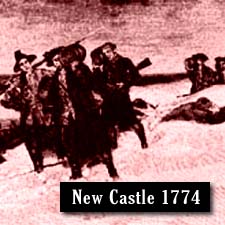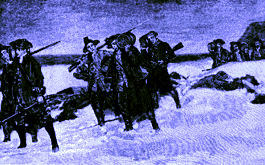|
FRESH STUFF DAILY |
|
|
||
|
|
||
|
|
||
|
SEE ALL SIGNED BOOKS by J. Dennis Robinson click here |
||
This historic battle, though little known outside the Granite State, was a seminal event in New England’s progress toward the American Revolution. Ignited by Paul Revere, hundreds of Seacoast New Hampshire men raided the armory of the British King in an rare act of open treason – four months before Lexington and Concord.
READ: The Shot Not Heard Round the World
Nevertheless, the first cargo of tea destined to bear the hated tax was unloaded at Portsmouth without incident 'and locked in the customs house. A special town meeting was called which requested, in the interests of the peace, that the chests be reshipped to Halifax. Although this was done, Governor Wentworth kept officers and magistrates on alert to suppress possible violence. A second cargo was also rerouted to Nova Scotia, but the merchant who had ordered it felt the consequences of a growing revolutionary spirit. The windows of his house were smashed by a mob. Tea Troubles By May of 1774 the news on every one's lips was the closure of the port of Boston. The Crown expected the "salt-water tea" to be paid for and the citizens of Boston to show some evidence of general remorse. The New Hampshire Committee of Correspondence, in a note which revealed its own stand on this paramount issue of the day, swore, ". . . ever (to) view your interests as our own." Obviously, Bostonians could count on support from New Hampshire. Governor Wentworth was aware of a radical shift both in public opinion and in the makeup of the provincial assembly, and attempted to garrison Portsmouth's only military post, Fort William and Mary in New Castle. In May, 1774 the assembly voted to grant him 200 pounds for that purpose. No doubt he felt this grossly inadequate, but an officer and three men were appointed to administer the fort in the king's name-a less than formidable army with which to stave off revolution. The Assembly, which did not appear intimidated by either the "army" at the fort or the governor's ire, voted later in the same month to establish a second Committee of Correspondence. The assemblymen were not dissuaded from their purpose by frequent adjournments and "cooling off" periods forced upon them by Wentworth and the Rockingham County sheriff. Dismissed from the assembly chamber for holding an illegal meeting, they retired to a local tavern and in that congenial atmosphere made plans for a Provincial Congress to be held at Exeter in July. Aid To Boston The Exeter meeting, unfettered by the trammels of royal intervention, recommended that New Hampshire towns, on their own, send some sort of material aid to the poor of Boston. This aid, which issued rapidly from the surrounding towns in bags, barrels, coffers, and on the hoof, also included letters of moral support. The meeting in Exeter provided proof, however seminal, that representative government in New Hampshire was peacefully changing hands.
The answer came on the afternoon of December 13, 1774, when Paul Revere galloped up the Old Boston Post Road into the city to deliver confirmation of the rumors. Yes, it was thought that troops and ships were on their way, and yes, if the' powder stored at William and Mary were not to remain in the king's hands, something had better be done about it. The Raid Begins The way seemed appallingly clear. A few minutes before noon on December 14, a drummer, his beats muffled by the falling snow, marched through the streets of the city sounding the call that everyone recognized. Before long, he had collected an entourage of more than two hundred men and boys. At the fort, guarding the king's powder, were the defenders-Capt. Cochran and five men. At about one o'clock, this tiny garrison received word that an angry mob was on its way from town, growing larger as citizens from Rye and New Castle hastened to join. By the time they reached the gates of the fort, the attackers numbered more than 400. At about three o'clock in the afternoon a few shots were exchanged, but no one was injured. Before a second volley could be fired, the fort was overwhelmed, and Cochran's band was in the hands of the attackers. Three huzzas were shouted and the king's colors were lowered. Cochran, though overwhelmed, showed no signs of allowing the keys to the powder magazine to leave his possession. Substituting shoulders for keys, the attackers broke down the door and were able to make off with 97 barrels of powder which they loaded onto moses boats and gundalows for dispersal to the various surrounding towns. The captain of the defenders wrote in his note to Governor Wentworth, "I did all in my power to defend the fort, but all my efforts could not avail against so great a number." With odds of four hundred to six, neither the governor nor posterity could fault him. Governor Wentworth, caught in an impossible situation, hastily requested ships and troops from Boston. Obviously, he had need of help, for the next morning men from the surrounding countryside began to pour into the city, lured by rumors of the previous day's events. John Sullivan of Durham and his men surrounded the state house and demanded information about possible reinforcements. "None were expected," said Wentworth. The mob dispersed, only to reassemble later that evening to remove remaining military stores from the fort. Again the trophies were loaded at the river. The powder was soon distributed. Kingston received 12 barrels, Epping 8, Poplin (Fremont) 4, Nottingham 8, Brentwood 6, and Londonderry 1. Remaining stores were distributed in Durham, which received 25 barrels, and in Exeter, where 29 barrels were retained. Four barrels remained in Portsmouth. The precious dust was destined for the powder flasks of the local militia units, the building blocks of the nascent continental army. The powder and the power no longer belonged to King George III, it was in the hands of the people. In New Hampshire, at least, the Revolution had begun. Originally published in "NH: Years of Revolution," Profiles Publications and the NH Bicentennial Commision, 1976. First reprinted here 1997 by permission of the authors and publisher. Please visit these SeacoastNH.com ad partners.
News about Portsmouth from Fosters.com |
| Thursday, April 18, 2024 |


|
Copyright ® 1996-2020 SeacoastNH.com. All rights reserved. Privacy Statement
Site maintained by ad-cetera graphics

 Smuttynose Murders
Smuttynose Murders



 NH HOT HEADLINES
NH HOT HEADLINES
 By December, 1774, news of additional parliamentary misdeeds had reached Portsmouth
both by messenger and through the New Hampshire Gazette, which told of the passage
of the Massachusetts Government Act the Quartering Act and the Quebec Act. It
was said that the king had imposed a secret embargo on the export of arms and
ammunition to his colonies. Moreover, patriots in Rhode Island had already seized
powder and shot from the royal garrison in Providence. What about Portsmouth?
Would there be troops and ships coming from Boston to keep the same thing from
happening there?
By December, 1774, news of additional parliamentary misdeeds had reached Portsmouth
both by messenger and through the New Hampshire Gazette, which told of the passage
of the Massachusetts Government Act the Quartering Act and the Quebec Act. It
was said that the king had imposed a secret embargo on the export of arms and
ammunition to his colonies. Moreover, patriots in Rhode Island had already seized
powder and shot from the royal garrison in Providence. What about Portsmouth?
Would there be troops and ships coming from Boston to keep the same thing from
happening there?














